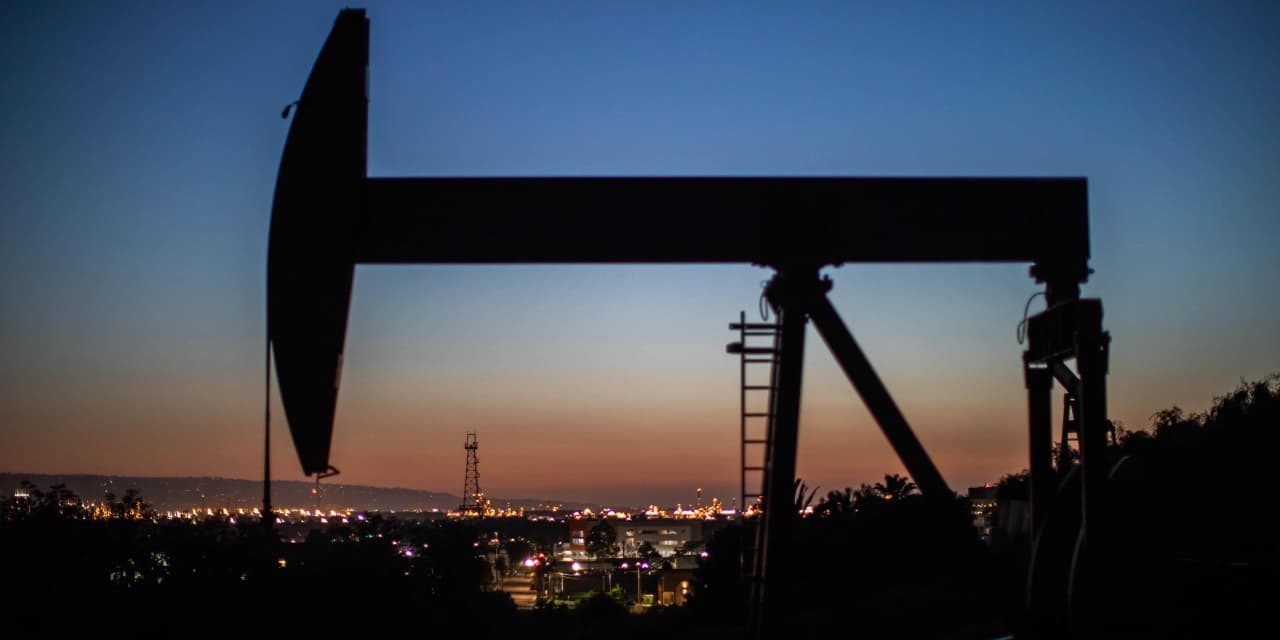Crude futures settled at a two-week high on Monday, finding support as attacks on shipping in the Red Sea by Houthi rebels heightened worries about supply disruptions from the Middle East.
Oil major BP PLC
BP,
BP,
said Monday that it was pausing all transits through the Red Sea due to worries over worker safety.
Price action
-
West Texas Intermediate crude for January delivery
CL00,
+1.28% CL.1,
+1.26% CLF24,
+1.26%
rose $1.04, or 1.5%, to settle at $72.47 a barrel on the New York Mercantile Exchange. -
February Brent crude
BRN00,
+1.32% BRNG24,
+1.32% ,
the global benchmark, climbed $1.40, or 1.8%, at $77.95 a barrel on ICE Futures Europe. Brent and WTI crude both marked their highest settlements since Dec. 4, according to Dow Jones Market Data. -
January gasoline
RBF24,
+1.57%
tacked on 1% to $2.16 a gallon, while January heating oil
HOF24,
+1.25%
climbed by 2% to $2.67 a gallon. -
Natural gas for January delivery
NGF24,
-0.20%
settled at $2.50 per million British thermal units, up 0.5%.
Market drivers
Major container shipping firms have paused transits of the strait of Bab al-Mandab, the Red Sea and Suez Canal in response to armed action by the Houthis, according to S&P Global Market Intelligence.
WTI edged up by 0.3% and Brent gained 0.9% last week, breaking a streak of seven straight weekly declines for both benchmarks, amid a rise in attacks on ships traveling through the Red Sea by Iran-backed Houthi rebels that control most of Yemen.
Read: Attacks in the Red Sea add to global shipping woes
“While these attacks aren’t necessarily new, they have increased in intensity in recent weeks,” Robbie Fraser Manager, global research & analytics at Schneider Electric, said in a daily note. “The Houthi forces lack the ability to attempt any sort of blockade on the region, but can continue to leverage asymmetric means to disrupt shipping and change the risk calculation.”
London-based energy major BP said in a statement Monday that “in light of the deteriorating security situation for shipping in the Red Sea, BP has decided to temporarily pause all transits through the Red Sea. We will keep this precautionary pause under ongoing review, subject to circumstances as they evolve in the region.”
“The Houthi — and by extension their main military backer Iran — are probably using their strike capability in the Red Sea to further exercise greater geopolitical influence in the region, in addition to influence on Israel’s war in Gaza,” said Jack Kennedy, head of MENA Country Risk, Global Intelligence & Analytics, at S&P Global Market Intelligence.
“The attacks are likely to continue to target international shipping irrespective of their public connection to Israel,” he said in emailed commentary.
Crude prices had risen modestly after the Oct. 7 Hamas attack on southern Israel on fears of a wider conflict, but soon gave up those gains to trade at roughly six-month lows early last week before seeing a modest bounce.
Last week’s Federal Reserve meeting, which saw policy makers signal that rates have likely peaked and reinforced market expectations for a series of rate cuts in 2024, also helped underpin crude, analysts said.
“Fundamentally, the dovish-received Fed decision shored up hopes for a soft landing while economic data was mixed but notably not ‘bad enough’ to rekindle hard landing fears,” analysts at Sevens Report Research said in a Monday note.
Read the full article here




